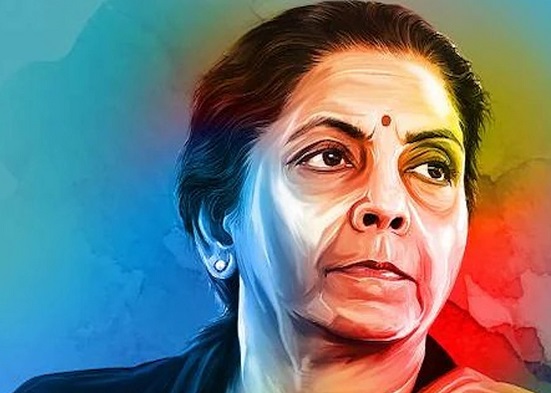Union Budget 2022 will be presented at a time when India is believed to be at the cusp of economic recovery from the pandemic knockout punch. Infrastructure and technology spending is likely to remain of the paramount focus alongside additional allocation for scaling up India’s manufacturing and easing ways for SMEs and MSMEs. The finance minister is expected to make announcements to clear the extrusive threads for making India more business-friendly.
ELE Times Sub Editors Mayank Vashisht & Sheeba Chauhan got the chance to speak with some of the electronics and technology industry’s experts and major companies, regarding the expectations and anticipations form the Union Budget 2022, from their vantage point. Excerpts:
Akshay Munjal, Founder and CEO, Hero Vired:

“The pandemic has reaffirmed the significance of digital technologies to sustain the momentum of learning. Hence, the Budget should consider EdTech as a potent tool that can multiply the reach of education. It should prioritise scaling up allocation to the EdTech sector by 7-8% from 2021. In addition, rationalising 18% GST in online education services would go a long way in making e-learning more affordable and realising its benefits. Moreover, there should be a tax rebate on expenses incurred on online learning programs. This is especially important in India as we face a unique ’employability paradox’. Against the backdrop of conducive policies such as the National Education Policy (NEP), strengthening infrastructure, ahead of the 5G rollout, will ensure equitable access to the highest-quality education to all learners. While NEP 2020 holds a lot of promise, much will hinge on its implementation this year.”
Lalit Mehta, Co-founder & CEO, Decimal Technologies:

“2021 was a transformative year for the fintech industry with significant technology adoption in financial services. While traditional lending still accounts as a major credit provider in India, digital lending has picked up pace with the ease of process, less paperwork and use of alternate data sources, making it a key enabler for the MSME sector.
Fintech players have already shown willingness to work with the government to curb the menace of illegal digital lending apps. Budget 2022 should introduce regulations that will help in greater credit access to MSMEs and curbing illegal activities while building trust in the digital lending process for the last mile. In line with the government’s goal of creating a digital economy, introducing credit schemes will incentivise the sector and help in providing timely credit to MSMEs that have struggled due to the lack of credit accessibility through traditional means of lending which has directly affected their business opportunity. We have also seen a rise in the number of start-ups that have turned unicorns in the last year that showcases the potential of the startup ecosystem in India. We expect the government to introduce regulatory changes that would create an easy line of access for start-ups & MSMEs to secure credit from online lending players. This will further help in boosting our economy”
Kalpit Jain, Group CEO, Netcore Cloud:

“For the upcoming budget 2022, the government should formulate a policy that focuses on indigenization in high priority technology areas, especially in the SaaS market. As digital transformation and cloud computing gain ground, SaaS has also rapidly become the software-delivery model of choice for enterprises. SaaS subscription-based model opens numerous opportunities across enterprises, and the Indian market is well-positioned to lead the space. Indian SaaS companies are building a talent pool of professionals with SaaS-relevant skills, also powering investors’ interest. Within the overall Indian SaaS landscape, enterprise collaboration, tech events, conversational artificial intelligence, and human resources tech – continue to drive investments and interest as businesses look for solutions in a post-pandemic world. The government should recognize the potential SaaS holds for increased contribution to the GDP by restructuring the IT function within the public and private enterprises. This can help streamline processes, build engagement, and deliver overall effectiveness and efficiencies. SaaS adoption is expected to grow across technologies and enterprises, and the industry could reach $1 trillion by 2030. We at Netcore Cloud remain positive on the tech-driven growth opportunities in the country and look forward to some favorable measures from the center.”
Omer Basith, Co-founder & CEO of Virtual Forest:

We hope that the Design Linked Incentive (DLI) scheme that the Ministry of Electronics and Information Technology (MEITY) announced last month for semiconductors is extended to other critical markets up the supply chain like motor controllers. The DLI Scheme offers financial incentives as well as design infrastructure support across various stages of development and deployment of semiconductor design for Integrated Circuits (ICs), Chipsets, System on Chips (SoCs), Systems & IP Cores and semiconductor linked design over a period of 5 years. The scheme is a welcome step by the government as it encourages enterprises to invest in Design and R&D capacity but additional policies and schemes will be required to ensure the success of the government’s plans for India’s semiconductor industry.
In particular, we are looking forward to the DLI scheme being expanded to include end product designs that utilise semiconductors (embedded systems) like motor controllers. Motor controllers are sophisticated electronic devices and are crucial components for applications like electric vehicles and consumer appliances. Ensuring thriving domestic industries for these components will provide critical support to India’s budding contract manufacturing ecosystem while also fuelling growth and innovation in these energy-efficient products. This will align with multiple strategic goals like AatmaNirbhar Bharat and the government’s EV targets for 2030 to name a few.
Ketan Patel, CEO, Mswipe:

“The SME sector is the backbone of Indian economy. In the upcoming budget, we expect the Government to make announcements that will empower small businesses thereby reviving the economy from the impact of the pandemic. In November 2021, the government announced the Special Credit Linked Capital Subsidy Scheme for the MSMEs (Micro Small and Medium Enterprises) in the services sector. This should be extended to SMEs whose turnover is less than Rs. 5 crore as well as it will help them procure service equipment through institutional credit for advancement of their technology. The Government should also look at tax breaks for companies providing technology support to MSMEs. At a time when we are expecting the third wave of Covid to hit economic activity and businesses are facing difficult times, the Government must take measures to meet the SME lending requirements. Subsidizing the cost of funds to NBFCs that focus on lending to small merchants for loans below Rs. 20 lakhs is a way to ensure easy access to credit. Besides, we expect the Finance Minister to increase credit guarantee for lending while also providing relief in terms of tax sops or subsidizing manpower cost for digital players to promote digital payments in tier 3 to 6 towns. Lastly, this Budget should further look at propelling the country towards a digital future. While multiple initiatives have been undertaken to promote digital payments, the Government must look at given some form of incentive to small businesses to encourage the adoption of digital payments and further strengthen the payment infrastructure of the country, especially in smaller towns.”
Kaustubh Belapurkar, Director, Manager Research, Morningstar India

- Align taxation on listed debt securities and debt mutual funds – Currently, bonds are subject to LTCG after a holding period of 12 months, while debt mutual funds need to be held for 36 months for LTCG. Uniformity in LTCG holding period criteria should be granted for both instruments.
- Introduce Debt Linked Savings Scheme (DLSS) – Similar to ELSS, introduction of a Debt Linked Savings Scheme, will incentivize a larger number of investors to invest into debt mutual funds.
- Expansion of Equity Oriented Funds Definition– Currently only funds that invest at least 65% into equities are classified as Equity oriented funds and thus granted equity taxation. Fund of funds that invest into underlying equity funds, meeting a similar criteria should also be granted a similar status.
Mohal Lalbhai, founder, CEO Matter:

“The year 2022 is a watershed moment towards the Electric vehicles transition. I am optimistic that the upcoming Union Budget 2022 will pave the way for further acceleration to the EV and Energy Storage segment by laying out a comprehensive and holistic plan. Firstly, I am hopeful that the Ministry of Power’s suggestions regarding charging infrastructure will be considered, as well as the revision of the FAME II subsidy condition of Rs. 1.5 lakhs on the ex-factory price of the EV on which a subsidy is applicable to the consumer, which is a five-year-old price point. Second, modifications to the current PLI to allow MSME EV players, as well as existing and new participants, to participate. Finally, a reduction in customs duty on Lithium-ion cells would help local component manufacturers in scaling up the production thereby further reducing the overall upfront costs of battery production and the cost of acquisition for Electric vehicles in India, thus creating the path towards achieving clean energy goals.”
Rajarshi Bhattacharyya, Co-Founder, Chairman and Managing Director, ProcessIT Global:

Government should support organisations to adopt the practices of Industry 4.0 by removing major barriers, especially those delaying modernisation of MSMEs and making them globally competitive. This sector is crucial as they play a key role in the nation’s development, contributing significantly to the GDP. Government support can provide further stimulus to the ‘Make in India’ initiative and boost up employment rates.
Massive boost is required for urban and transportation infrastructure development with increase fiscal stimulus and private sector participation to meet the growing demand of industries. The budget should have policies to incentivise innovation in the banking industry by leveraging technology and digital transformation.
The focus now should also be on policy reforms that will boost private investments. More favourable policies for 100% owned and incorporated IT services and technology companies in India should be put in place as they play a key role in boosting the economy and generating employment.
With data privacy and security taking centre stage across industry verticals, government should incentivise organisations to strengthen their data security infrastructure. A robust cybersecurity policy is required and more focus should be on Cybersecurity services and products sector to increase investments and innovation here.
The Government should further support in innovation and R & D in the sector, especially in digital technology research to remain competitive.
More Learning & Development initiatives pan India to the district and town levels to train freshers in new-age skills should constitute a major part of the skill development agenda. Secondly, as the demand for cybersecurity professionals is on the rise with limited number of skilled candidates to fulfill the requirement. Government should support developing next generation cyber security professionals with various skill-building and re-skilling programs.
Chintan Mehta, Associate Director – Capital Markets & Asset Allocation, Morningstar Investment Adviser India:

One of the key highlights of the FY 2022 budget announced last year was the focus on capital expenditure. Capital expenditure growth was estimated at 26.2% with a focus on infrastructure spending (railways, defence, housing, road transport, and highways). As a portion of total expenditure, share increases to 15.9% from 12.7% in FY21. This was viewed positively as higher capital expenditure share would give a required fillip to the lagging investment capex. For the period April to October 2021, capex surged by 28.3%. A similar capex growth estimate for FY 2023 (north of 20%) could crowd in private investment and improve medium-term growth prospects. This would be a crucial factor to support economic growth as private consumption expenditure growth remains subdued. Continuation of a few additional measures such as special assistance to states which offer interest-free loans for capital expenditure and permitting states to undertake additional borrowing on meeting the capex target would make the high double-digit capital expenditure growth target achievable.
On the revenue front, the government accounts seem to be in a comfortable position with revenue receipts as a percentage of budget estimates at 70.5% as of October 2021. This is largely driven by high tax revenues and higher-than-budgeted dividend transfers from the RBI. Disinvestment continues to be a missing element with only 5.2% of the budgeted disinvestment target of INR 1.75 lac crores has been raised in the first half of FY 2022. IPO of LIC could help mop up a huge chunk of the target, however, the probability of this and other privatisation happening in the rest of FY 2022 seems bleak and will likely see a rollover to FY2023.
The first advance estimate of FY2022 GDP growth came in at 9.2%, slightly lower than the RBI’s estimate of 9.5%. This would bring GDP slightly (1.26%) above the pre-pandemic level. However, to achieve a potential GDP growth rate of 7% – 7.5%, all engines need to fire. Private expenditure needs to pick up in a meaningful manner. This can be supported by an additional fiscal boost in FY 2023 to improve disposable income and will help in reviving consumption demand on a durable basis. Improvement in the quality of government expenditure should continue in FY 2023. Strong external demand is an opportunity for India and further policy support should help in capitalizing on this, making India export attractive and an alternative. The Production Linked Incentive (PLI) scheme to boost local manufacturing is a step in the right direction. The evolving Omicron situation poses a threat to the local and global growth recovery. However, the severity of the new covid variant is comparatively low and might not derail the growth trajectory in a meaningful manner.
Overall fiscal deficit for FY 2022 could come in lower than the target of 6.8%, at around 6.5%, supported by improved revenue. For FY 2023, the fiscal deficit could see some moderation if revenue receipts continue to see strong growth. The focus should continue to be on increasing disposable income, capex and exports, and gradually move towards fiscal consolidation roadmap of 4.5% by 2025-26. Any slowdown in the economy due to covid could change the fiscal math as revenues may see a shortfall and expenditures would need to happen to support the economic revival. In this situation financing of the fiscal deficit would largely come in from market borrowing and small savings. This could put pressure on the long-term G-sec yields. Our asset class research suggests that going ahead, investors will struggle to post significant gains in bonds as we are around the turning point of the current low-interest rate cycle. The annual return expectation from bonds would be more normalized as compared to high teen returns delivered in the last couple of years.
Prashant Lohia, CEO and Founder, Ginesys:

“The ongoing pandemic has proved a catalyst for the digitization drive, with service providers stepping in to bridge the gap between the rural and urban landscapes. The Government is keen on a Digital India, and we expect the Union Budget 2023 to depict a greater and more sustained push towards the same, especially with regards to digital payments and retail technology. We expect the Union Budget to bring in more reforms for domestic retail manufacturers and brands as this would drive the Make in India and AatmaNirbhar Bharat initiatives while offering support and strengthening the local retail landscape. We are also keen on more clarity around the e-commerce guidelines and hope the Government promotes the sector in the upcoming budget. Further, we look forward to a well-calibrated reduction in income tax slabs as this will help taxpayers save money and, the money thus saved can fuel further consumption and economic growth, helping revive the economy as a whole. We also hope that the upcoming Budget focuses on growth and promotes spending by dropping the already deferred GST on textiles and garments.”
Anil Kumar, President and Managing Director, SEG Automotive India:

After a lull in the last 3 years due to an economic slowdown and 2 consecutive years of the pandemic, Indian Automotive Market is looking for a quick revival and its expectations from Budget 2022-23 have risen further up to support growth across the industry. Amid rising fuel prices the Indian market also witnessed movement towards Electrified vehicles, especially in 2 & 3 wheeler space. Presently we still see a high level of imported parts/systems in the market.
We at SEG Automotive India are fully committed towards e-mobility by bringing in localized system solutions to the Indian market. We look forward for Government to provide further impetus by bringing EV favourable schemes to reduce imports and to promote & strengthen local manufacturing. Also, the recently announced PLI scheme to be more friendly to mid-sized component manufacturers to be in a position to avail the benefits of the scheme.
Lalit Beriwala, Director, Shyam Steel Industries Ltd:

India’s micro, small and medium enterprises is second in number only to China. MSMEs are integral to our economy contributing 30% to the country’s GDP, 50% to the export and employment generation of over 100 million, next only to the Agri sector. Their contribution towards delivering social justice for containing regional disparities and equitable economic growth is no less important factors for the Government to take note of.
Improved performance of MSME sector is vital for achieving global benchmark efficiency and quality of products being manufactured in India, as it supplies goods and services to big industrial enterprises. The Government, therefore, should invest in providing backend services to improve performance of MSMEs. Lack of technology-based production and low investment in research and development are bottlenecks for the sector to become globally competent. Government could subsidise internationally available technology for adoption by MSME players to improve their product quality, utilizing their existing resources. Hand holding by designated academic institutes of repute in the same geographical territory for product innovation can also support their cause.
For a more equitable distribution of national resources, policy support to MSMEs also can help unleash their potential. For example, if the Government decide to roll out PLI schemes exclusively meant for MSMEs, it can provide them with a coverage against fierce competition with the bigger business houses to stake claims on incentives for improved performance.
Growth of Indian steel industry has been driven by domestic availability of raw materials such as iron ore and coal. Consequently, steel sector has been a major contributor to India’s manufacturing output. For MSMEs to play a bigger role, Government may consider allocation of smaller mines of Iron Ore and Coal through the e-auction process amongst MSMEs alone, which will protect them from the competition with the bigger businesses.
MSME sector, therefore, look forward to an enabling ecosystem provided by the Government in the manufacturing and steel industry domain, with budgetary and policy support, to emerge as an equal partner in making India self-reliant and transcending it to a $5tn economy.
Rohan Vaidya, Regional Director of Sales – India, CyberArk:

“Digital India is India’s vision for a country running on improved online infrastructure to enable e-services and a digitally-powered economy. I believe this year’s Union Budget will see some focus on the government’s continued efforts in this area, since it will play an important role in our quest to become a US$5 trillion economy by 2025.
As technology allows society to become more connected, security becomes more important than ever. By adopting centrally managed controls and monitoring of IT and cyber security, we can ensure the protection of data, on-premises and in the clouds. An identity-driven approach to security that applies the right level of authentication and security controls to individuals based on their role, what they need to access, and how long they need to access it for, will be vital to stopping cybercriminals from gaining privileged access to critical data and assets.”
Sharan Nair, Chief Business Officer, CoinSwitch Kuber:

“Various macroeconomic developments in India and the world over the last year have led to a rise in crypto adoption in India. Today, leading crypto exchanges follow strict self-regulatory practices to ensure customer protection. We hope the upcoming Union Budget will bring in regulatory clarity and help standardize best practices, address misconceptions around this emerging asset class. We believe a regularised environment will encourage more Indians to start their crypto investing journey, promoting financial inclusion in line with the government’s vision.”
Gurjodhpal Singh, CEO Tide(IN):

“This is third year of the pandemic and MSMEs have been struggling all through since early 2020, several small businesses had to downsize or shut shop as they were challenged by severe liquidity crunch and dipping demand. Being central to the economy, MSMEs need assistance to be back on track and government can provide that much-needed support through a stronger policy thrust. Unavailability of working capital, cost of compliance and taxation are potential challenges that need be addressed. We are looking forward to a budget that will further push for digitization. Significant spends and allowances for infrastructure, especially digital banking infrastructure will also be an important ingredient for the success of both, the budget and MSMEs. These steps can boost financial inclusion to a great extent. Lastly, steps with focus on new businesses and enabling entrepreneurship are key to provide the much-needed impetus for the sector.”
Anand Kumar Bajaj, Founder, MD & CEO, PayNearby:

“The digital payments space has proved its mettle as a stable growth avenue during the pandemic. A positive impact was seen on digital payments due to benign taxation for self-service digital customers. To ensure the same benefits reach the less-savvy citizens, our government could waive GST and TDS for financial inclusion services at Business Correspondent (BC) outlets across India. A GST and TDS waiver will help reduce the cost of offering seamless financial services and help high-end tech reach the technology-oblivious segment. We stand with the government’s intent of taking digitization to the last mile and passing the GST waiver benefit to end-users as this will push for greater financial inclusion and a digital economy in the country.
Moreover, low-income citizens are mostly catered to by low-earning retailers who barely cross the value of taxable income, and hence, do not file IT returns to claim a refund of TDS. Thus, TDS is only a cost to them and not a refundable deduction because they do not know how to take a refund by filing returns. We sincerely hope that TDS for income below ₹ 50,000 a year can be waived off. We are positive that this Budget will consider the grim working condition of the BC network and make the needful regulatory changes to ensure the viability of a community that has been vital in driving the cause of financial inclusion and democratization of digital payments in the country.”
Bhavin Patel, Co-founder & CEO, LenDenClub:

“The economy is projected to gradually return to its previous trajectory, with fiscal priorities in the upcoming budget invigorating it. A regulatory body to oversee payment recovery is the need of the hour. An enhanced procedural aid to the legal recovery of repayments from digital borrowers to further protect the rights of those who lend money. Such a specialized government vehicle to oversee fintech could not only help startups run more effectively, following compliance requirements, but it would eliminate possible fraudsters.
Returns from investments in Peer-to-Peer (P2P) Lending could be exempted from tax under Section 80C of Income Tax law, or a different provision could be carved out to reduce tax rates such as tax exemption for gains below Rs 20,000. This will encourage people across geographies to invest in P2P lending, making funds accessible on multiple platforms. P2P lending plays a significant role in empowering small businesses in India. Tax benefits in P2P lending will magnify the growth of businesses when capital from P2P platforms is diverted to the sector.
The pandemic has resulted in significant job losses, primarily due to people’s inability to keep up with evolving technology. The way the government is spreading awareness is remarkable. Further to that, setting up avenues for advanced technical education, for instance, could help it drive so much further. Presently, India requires professionals with technical and financial competence to conduct the Fintech revolution. More institutions that provide formal education and certifications are needed to create a skilled group of individuals required to grow P2P lending platforms and the Fintech industry.”
Pratik Gauri, Co-founder & CEO, 5ire:

“Crypto technology and blockchain are long-term phenomena that are not going away. And as the government regulations focus on protecting its constituency from the bad it does, it should also look towards utilizing its power of good for better governance and accountability. India has been a significant player in developing solutions for the rest of the world with modern technology; it is high time we become a model of utilizing it ourselves.
The Union budget should include more resources to make our cities into more efficient, better governed, smart cities. We can create models in infinite ways, from more robust policing to e-voting, to more efficient ways to provide public services leveraging blockchain. The Union budget can aspire to not only reflect the value these services deliver day-to-day but to audit, be accountable, and find ways to provide a groundswell in adoption of blockchain technology in the meat and bones of the largest democracy in the world.
Lastly, the Union Budget 2022 can be a starting point for adopting the UN 2030 Sustainability goals not only in words but in spirit to address a spectrum of work areas, chief among them environmental sustainability, or the intentional and careful use of natural capital such as water, air, solar, mineral resources, timber, and land.”
Ashraf Rizvi, Founder & CEO, Gilded:

“Gold has always been an important part of savings/ investment/ wealth portfolios not only in India but also across the world. In India, however, investment in gold is as much a cultural phenomenon as it is a financial one. This cultural tradition has adapted to the times with the introduction of digital gold. This new, convenient, and safer way to access physical gold has seen increased investments from new-age first-time investors. Millennial and Gen Z age categories undoubtedly take to this storage-proof, quality-assured, easy-to-transact new-age asset. Multiple wealth-tech applications have come to the fore, highlighting the growing need for a progressive regulatory framework for this asset class.
While gold has been a stable store of value with positive returns over the historical long term, the future demand for the digital alternative will depend in no small part on government regulations and policies. The Union Budget should be looking at formulating transparent guidelines for investor protection and chalking out a clearly defined regulatory framework consistent with other parts of the gold industry. Currently, capital gains on profits from the sale of gold can be as high as 20% compared to profits on shares taxed at 10%. An alignment among the tax regimes for investments would give investors greater flexibility in choosing the assets that best fit their needs as a store of value and foundation for wealth creation.
Increasingly, the world will look for fast, efficient, cost-effective, and environmentally friendly ways to assign and move value without excessive paperwork or the need to transport physical objects. Digital gold is an essential first step in this technological evolution. The Union Budget 2022 can bring in proper regulatory guidance, framework, and business incentives, and pave the way for India to become a leader in developing the capabilities, technology, and infrastructure necessary to digitize physical gold assets.”
Dilip Modi, Founder, Spice Money:

“The fintech industry has fared really well in the last two years with the pandemic playing a key role in the digital adoption of financial services across the country. With the government making strides through several initiatives including the recently set up Fintech Department and the introduction of Payment Investment Development Fund (PIDF), the sector is expecting to see more opportunities and initiatives being taken forward by the government that will help in the expansion of the market, influence customer behaviour, and impact long term changes in the financial industry.
As our country sets upon the goal of hitting the $5-trillion mark by 2025, I expect the digital economy to grow even further, with a majority of India’s population and small businesses adopting digital means to access payments and financial services. The rural sector will play a huge part in achieving this economic landmark, and the upcoming Union Budget 2022-23 should ensure there’s a special focus on bolstering rural development. Exemptions on procurement of point of sale terminals, GST rates for rural banking agents remitting funds among households, and subsidies to compensate for merchant discount rate (MDR) waiver are among some of the measures that will help in promoting digital awareness and initiatives across the country.”
Gaurav Dahake, Founder & CEO, Bitbns:

“From the upcoming union budget, we expect clarity in terms of how crypto transactions will get regulated. There have been many discussions going around in the crypto space; however, no concrete output so far. As an exchange, we have been working on this along with the finance ministry, creating favourable regulations. We have shared deeper insights and statistics that showcase the size of the industry, the scale, and the growth rate it offers. How critical it is to various vital pillars of the economy, including employment creation and how people have been interacting with different crypto products that would ultimately help grow the Indian economy. Therefore, with the upcoming union budget, we expect detailed clarity on how it will be regulated and an introduction to a tax regime that would be more fruitful. 2021 was the most significant year in terms of how things shaped up for the crypto industry in India and as a crypto community. With a robust mechanism in place, 2022 would be the year of mainstream crypto adoption.”
Anurag Sinha, Co-founder & CEO, FPL Technologies

“The Fintech space has not only accelerated the ‘Digital India’ initiative by years, but introduced an array of new-age platforms powered by super apps offering multiple services through few swipes on a mobile – significantly influencing digital adoption across the spectrum including payments and credit. While the pandemic triggered a steep rise in demand for consumer credit, it also highlighted the lack of credit penetration in the country. However, given the rise of smartphone usage, shift to digital avenues and the increasing number of digitally-savvy consumers, licensed digital banks can effectively enhance reach and bridge this gap. A digital bank license regime will therefore enable fintechs to leverage their tech-stack optimally to create credit products and user experience which will redefine the investment and consumption landscape in the country.”
Mughilan Thiru Ramasamy, CEO & Co-founder Skylark Drones:

“2021 has been a great year for UAVs with the introduction of new drone rules and PLI scheme. The global pandemic has accelerated digitisation and the digital shift offers a great opportunity for the drone industry to flourish and grow in the years to come. Businesses and other stakeholders have started realising the exciting possibilities that drones offer and we have witnessed a significant increase in usage of UAVs by the government and enterprises across sectors.
Today, both enterprises and the government are realising the economic and social opportunities that India’s widespread and dispersed geospatial assets can provide to the nation. UAVs offer an ideal compromise between scalability, economic feasibility, immunity to error and productivity compared to aerial data obtained from satellites and terrestrial data from scanners. The faster adoption of UAVs is therefore critical to realise the potential of these geospatial assets. The country would also benefit from a structured training system for aspirants who want to join the UAV industry, thereby accelerating job creation. The market has great potential and will need trained professionals to realise the aim of making India the global drone hubby 2030. Initiatives must be taken to introduce more training institutes for the industry. We are hopeful that Budget 2022 allocates more tax and non-tax incentives to the UAV sector to catalyse the growth of the industry and have a positive and cascading effect across the enterprise and social ecosystems.”
Tikam Jain, CEO and founder at Fleeca India:

“In the coming Union Budget session, we are expecting an increased focus on implementing Fintech Park in Rajasthan for start-ups that was discussed in the last year’s budget. The implementation of the Fintech Park policy will support the start-ups in Rajasthan with their office locations and other requirements.
Some reforms that are likely to boost the start-up industry include relaxing the taxation of employee stock ownership plans (ESOPs) and lowering the compliance burden on foreign investments in Indian startups. It will assist the start-ups to become more globally competitive and promote faster wealth creation across the board. The government’s commitment to make India a global manufacturing hub and ‘AtmaNirbhar’ with ‘Make in India’ vision will potentially help in increasing penetration and expansion of tech & automobiles market.”
“The logistics industry has to deal with unpredictably high fuel prices, and its exclusion from the GST regime is putting barriers to growth in this sector. This industry has a greater CAPEX cost, which makes the liquidity cycle for enterprises more difficult. The GST on reefer vehicles is currently 18 percent; therefore, lowering it will considerably encourage firms to invest in them and prosper on their voyages. Similarly, expanding the subsidy plan to these vehicles would be a smart move that would allow players to operate more smoothly and without financial strain.”
Girish Nagpal, CEO, MetroRide

“Adoption” is the single biggest prerequisite for the Electric Vehicles industry today. A PLI Scheme has been announced by GOI but that only benefits certain big companies; while this was important, the major work in EVs is being done by the new-age startups & our MSMEs. MSMEs & Startups need to be incentivized for using electric vehicles in their delivery or passenger fleet, building technology or HW around different aspects of EVs, charging Infra etc. Further, financing to such organizations has always been a challenge in general, and with higher risks perceived with newer technologies, there is a huge dearth of debt options for smaller companies working in the EV sector. Hence, there is a prodigious need for this sector to be brought in under the gamut of Priority Lending. Moreover, we see the major adoption for EVs coming from B2B fleets and hence some major initiatives need to be rolled out for companies/ fleets running with 100% EVs. It can be by providing special grants, exemptions in GST & other taxes, or incentives for every green KM a fleet runs.”
Roland Landers, CEO, All India Gaming Federation

“The online gaming industry is growing at an impressive CAGR of 25% – 30% and holds significant potential for overall economic growth, job creation and contribution to the government’s vision of a trillion-dollar digital economy by 2025. To enable the industry in realising its peak growth potential, it is imperative that the GST regime for online gaming industry is kept rational and at par with other technology platforms and services. It is important to highlight that regressive taxation of these emerging sectors may only make the business unsustainable in India. Our recommendation is that the tax authorities should align its policies with internationally accepted principles of taxing the online gaming sector and provide certainty to the industry.”
V. Anbu, Director General & CEO, Indian Machine Tool Manufacturers’ Association (IMTMA) and Bangalore International Exhibition Centre (BIEC).

In order to resuscitate growth, the Indian machine tool industry seeks a combination of policy initiatives, fiscal incentives and specific schemes while formulating the Union Budget 2022-23.
- In terms of specific schemes, there is a need for
- continued budgetary support for Scheme for Enhancement of Competitiveness in the Indian Capital Goods Sector Phase I and advance budgetary allocation for Phase II
- reactivation and extension of Credit Linked Capital Subsidy Scheme for another 5 years with an enhanced limit of Rs. 2 crores
- As part of policy measures,
- land for manufacturing industries may be allotted to industries on a nominal upfront payment through long-term annual lease rent, instead of recovering full price, which will help in enabling cash flow for productive assets
- the industry also calls for permanent replacement of bid security / earnest money deposit with “bid security declaration”
- When it comes to fiscal measures
- a higher depreciation of 25% on procurement of new indigenous capital goods besides mandatory registration under TReDS for all companies with a turnover beyond Rs. 250 crores
- For export promotion,
- establishment of Brand India Technology Centres by the Government of India in potential overseas markets for facilitating and promoting exports of capital goods and other engineering equipments.
Prof Debabrata Das, Director, IIITB

COVID-19 has thrown countless challenges that may take years to tackle. The higher education sector withstood these turbulent times and responded quickly by completely shifting to an online mode of delivery in a short span of time. Colleges and universities have realized this transformation is for the better and will continue to use technology in classrooms even after the pandemic is over. This calls for a pressing need to invest in infrastructure development for seamless internet connection. Subsidized access to laptops for students and faculty will be required for live or recorded teaching. Easy access to all forms of knowledge have become important and requires high-quality internet. By providing a good internet infrastructure and access to 5G internet in the near future at subsidized tariffs, the government will help students easily access e-resources.
Digital education being the new normal, it is important to upgrade teaching methodologies. The education sector is seeking faculty upgradation programs amid these rapidly changing times. In 2021, the Central Government had slashed its allocation towards Education by 6%, however, in 2022, the government can increase the allocation by around 10% since the previous year’s reduction was attributed towards impetus to healthcare last year.
The implementation of the new National Education Policy requires a lot of support to create the right infrastructure, more corpus for mainstream education and reduce the digital divide in smaller towns. It will be a welcoming change if this year’s budget supports strengthening inter-institutional collaboration and form city-based R&D clusters to improve the research ecosystem in the country.
EdTech Startups are the forerunners in disseminating skills as well as conceptual knowledge. However, startups require financial support from the upcoming government budget in the form of funding and tax exemptions in the initial years.
Mohandas Ukkandath, MD, Sparr Electronics Ltd:

“Standardisation and /or simplification of all statutory and tax-related processes to enhance the ease of doing business score even in view of the Govt’s increased need for transparency and monitoring will help all industries and especially the MSMEs to post better business growth and increase exports.”
Mayank Vashisht & Sheeba Chauhan | Sub Editor | ELE Times

